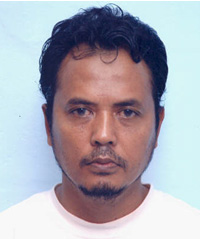
Jemaah Islamiyah is a Southeast Asian Islamist militant group based in Indonesia, which is dedicated to the establishment of an Islamic state in Southeast Asia. On 25 October 2002, immediately following the JI-perpetrated 2002 Bali bombings, JI was added to the UN Security Council Resolution 1267.

The Singapore embassies attack plot was a plan in 2001 by Jemaah Islamiyah (JI) to bomb the diplomatic missions and attack personnel of the United States, Australia, the United Kingdom, and Israel based in Singapore. There were also several other targets. The plot was uncovered in December 2001 and as many as 15 people were arrested in Singapore within a month. Further investigation and intelligence prompted the detention of another 26 persons from 2002 to 2005. As of 2006, 37 of them were still being detained without trial, under the Internal Security Act. Four had been released on restriction orders.
The Rizal Day bombings, also referred to as the December 30 bombings, were a series of bombings that occurred around Metro Manila in the Philippines on December 30, 2000. The explosions occurred within a span of a few hours, killing 22 people and injuring over 100 others.

A one-tonne car bomb, which was packed into a small Daihatsu delivery van, exploded outside the Australian embassy at Kuningan District, South Jakarta, at about 10:30 local time on 9 September 2004, killing 9 people including the suicide bomber, and wounding over 150 others. The explosion gutted the Greek embassy on the 12th floor of an adjacent building, where three diplomats were slightly wounded. Damage to the nearby Chinese embassy was also reported. Numerous office buildings surrounding the embassy were also damaged by the blast, which shattered windows in buildings 500 metres (500 yd) away, injuring many workers inside, mostly by broken glass.

The Johor Bahru District is a district located in the southern part of Johor, Malaysia. The heavily suburban/suburbanizing district covers an area of 1,063.97 km2 (410.80 sq mi) and has a population of 1.71 million. The district capital is Johor Bahru City and the administrative capital is Iskandar Puteri City. The district borders Pontian District on the west, Kota Tinggi District on the east, Kulai District on the north and Straits of Johor to the south. The urban centres are divided into the cities of Johor Bahru, Iskandar Puteri and Pasir Gudang.

The Royal Ranger Regiment is an infantry regiment of the Malaysian Army. Although it is second in seniority to the Royal Malay Regiment, the RRD can trace its origins back to the mid 19th century and the establishment of The Sarawak Rangers, the peacekeeping force in the Sarawak region. This force was absorbed by the Sarawak Constabulary in 1932, but the name was revived in 1941 as a British Colonial unit; this unit commanded by British Lieutenant Colonel C.M. Lane was captured by the Japanese in 1942.
Counter-terrorism in Singapore is a series of detection and prevention measures to minimize the damage caused by terrorism. These measures involve the participation of all levels of society, including defence, internal security, border and infrastructure security, civil defense, and gives special focus on areas such as medical readiness and psychological preparedness.
A suicide bomber detonated a car bomb outside the lobby of the JW Marriott Jakarta hotel on 5 August 2003, killing 12 people and injuring 150. Those killed included 11 Indonesians and one Dutch national. The hotel was viewed as a Western symbol, and had been used by the United States embassy for various events. The hotel was closed for five weeks and reopened to the public on 8 September 2003.

Noordin Mohammad Top was a Malaysian Muslim extremist. He was also referred to as Noordin, Din Moch Top, Muh Top, Top M or Mat Top. Until his death, he was Indonesia's most wanted Islamist militant.
On the 2000 Christmas Eve, a series of explosions took place in Indonesia, which were part of a high-scale terrorist attack by Al Qaeda and Jemaah Islamiyah. The attack involved a series of coordinated bombings of churches in Jakarta and eight other cities which killed 18 people and injured many others.

Mas Selamat Kastari, a Muslim Indonesian-born Singaporean, was for more than a year Singapore's most-wanted fugitive after escaping from detention on 27 February 2008. The search for him has been described as the largest manhunt ever launched in Singapore. He was eventually recaptured in Skudai, Malaysia, on 1 April 2009, over a year after his escape, and has since been returned to Singapore. His escape was found to be one of the events in Singapore's history that Singaporeans were most aware of, with 95% being aware of it.

Pasukan Gerakan Khas is a special operations command of the Royal Malaysia Police (RMP). The PGK has two distinct sub-units; the Special Actions Unit and the 69 Commando Battalion.

Terrorism in Indonesia refer to acts of terrorism that take place within Indonesia or attacks on Indonesian people or interests abroad. These acts of terrorism often target the government of Indonesia or foreigners in Indonesia, most notably Western visitors, especially those from the United States and Australia.

Huda bin Abdul Haq was an Indonesian terrorist who was convicted and executed for his role in coordinating the Christmas Eve 2000 Indonesia bombings and 2002 Bali bombings. Mukhlas was a senior and influential Jemaah Islamiyah leader with ties to Osama bin Laden.
Counter-terrorism in Malaysia is a series of measures implemented in Malaysia to detect and prevent terrorism as well as to minimise damages from such terrorist acts should they occur. These measures involve all levels of security services including military, police, border and infrastructure security, civil defence, medical readiness and psychological preparedness. Malaysia also participates actively in international counter-terrorism efforts. The Internal Security Act 1960 (repealed 2012, replaced with Security Offences Act 2012 was enacted to prevent terrorism in Malaysia.
On April 15, 2011, a suicide bomber detonated an explosive device in a mosque in a police compound in the city of Cirebon, in West Java, Indonesia. The attack occurred around 12:20 WIB (UTC+7) during Friday prayers.

Zulkifli Abdhir was a Malaysian who was one of the FBI Most Wanted Terrorists. The American Federal Bureau of Investigation (FBI) agency offered a US$5 million reward for information leading to his capture. He was the maker of bombs delivered for usage to several terrorist groups. He was often referred to by the nom de guerreMarwan. He was suspected of leading the Kumpulan Mujahidin Malaysia (KMM), being part of the central command of the Jemaah Islamiyah (JI), and of involvement in the 2002 Bali bombings. He was suspected of hiding in Mindanao under the protection of the Bangsamoro Islamic Freedom Fighters.
The 69 Commando ; also known as Very Able Troopers 69 is an elite multi-tasking special forces unit of the Royal Malaysia Police. The VAT 69 is based at Ulu Kinta, Perak and together with Special Actions Unit, they are part of Pasukan Gerakan Khas. The mission of 69 Commando is to conduct high-risk tasks such as counter-terrorism, hostage rescue, intelligence gathering and counter-insurgency within the borders of Malaysia.

The Special Actions Unit, commonly known as and abbreviated to UTK is a tactical unit of the Royal Malaysia Police (RMP). The unit is headquartered at the RMP buildings in Bukit Aman, Kuala Lumpur. Together with the 69 Commando, they form the Pasukan Gerakan Khas.
Events in the year 2024 in Malaysia.











